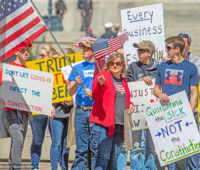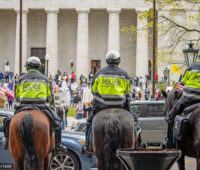Writing for the “Covid-19 and the Social Sciences” series, Jonathan S. Hack and Cole Edick examine the deference of the judiciary toward other branches of government during crises, such as the ongoing pandemic. How deferential will courts be toward broad government action by executives and legislatures that restrict rights and liberties in the name of ensuring public health and safety? Pointing to historical precedent and recent coronavirus-related cases brought before the judiciary in the United States, they argue that courts are likely to act as legitimating agents that promote and expand state police power in times of crisis.
Starting with SSRC president Alondra Nelson’s reflections on “Society after Pandemic,” this series of essays explores the human, social, political, and ethical dimensions of Covid-19. These pieces call attention to how social research can shed light on the short- and long-term effects of the pandemic and what can be done to improve responses, both now and in the future.
The publication of this series would not be possible if not for the help of the following SSRC staff:
Juni Ahari, communications and editorial assistant.
Cole Edick, program associate, Anxieties of Democracy and Media & Democracy programs.
Carrie Hamilton, program assistant, Social Data Initiative and Media & Democracy program.
Saarah Jappie, program officer, Transregional Collaboratory on the Indian Ocean.
Michelle Lee, program assistant, International Dissertation Research Fellowship.
Line Sidonie Talla Mafotsing, communications and editorial assistant, African Peacebuilding Network and Next Generation Social Sciences in Africa.
Daniella Sarnoff, program director, International Dissertation Research Fellowship.
Catherine Weddig, program assistant, Social Data Initiative and Media & Democracy program.
Themes
Essays


Can Democracies Handle Systemic Risks?
by Miguel CentenoIn this essay for our “Covid-19 and the Social Sciences” series, Miguel Centeno reviews T.H. Marshall’s trilogy of civil, political, and social rights, raising questions about how such rights might be affected during major systemic crises. Can democracies successfully manage systemic challenges under global crisis conditions, with attention to each set of rights? Are some rights easier to defend than others during crises? And, when is the collective good allowed to supersede individual freedoms? He calls for democratic theory to answer these questions, arguing that systemic crises represent a similar challenge to democracy as natural disaster or war.

Covid-19 Responses in Africa: Implications for Peace, Security, and Public Health
by Johannes John-Langba and Vivian Nasaka John-LangbaGiven the challenges that many African countries face with weak health systems, the implications of the Covid-19 pandemic on public health, peace, and security on the continent are dire.


